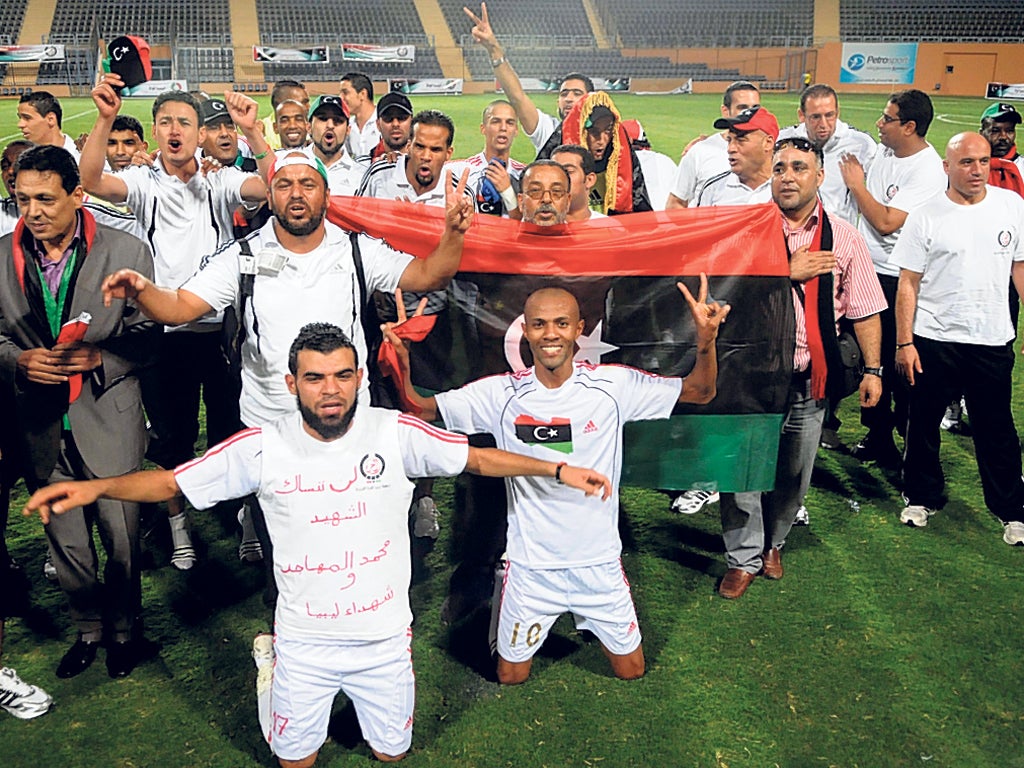Libyan team captain: 'We are brothers. If we win now, it will be for all of Libya'
Tomorrow's African Nations Cup opener features a nation for whom just being there is a triumph. Jonathan Wilson hears why

On the face of it, 151st in the Fifa rankings against 63rd doesn't sound like the most intriguing fixture with which to kick off the 28th African Nations Cup, but football is about more than just statistics. When Libya walk out to face the hosts Equatorial Guinea in the Estadio de Bata tomorrow evening, whatever they end up doing, it will represent another stage in an extraordinary journey.
In March last year, Libya played the third of their six qualifiers for the Nations Cup. The civil war had begun a few weeks earlier, forcing the game to be moved to Mali and, even though they beat the Comoros 3-0 to go top of the group, nobody really expected them to secure a third qualification for the tournament.
Inevitably, questions were asked about the war. "The whole team is for Muammar Gaddafi," said the team's captain and star, Tariq Al Taib. "We dedicate this victory to the Libyan people who are suffering." He went on to describe the rebels as "rats" and "dogs".
Al Taib isn't in the team any more. The months after that Comoros game saw remarkable changes, both in the national side and in Libya itself.
Walid Al Kahatroushi scored the opening goal in the game in Mali, but as Libya went to Comoros at the beginning of June, news reached him that a friend of his, a rebel, had lost his arm in the fighting. He decided he could bear no longer to pull on the Libya shirt, with its Gaddafi-era flag, so walked out on the squad, going back to Libya to join the rebels at Jebel Nafusa near the Tunisian border.
At first, his fellow rebels tried to protect him, keeping him off the front-line, but as the situation became increasingly desperate that became impossible. "I just took the gun and I went out fighting," he said. "It was so hard, you can imagine, you could lose your life at any time. It was so hard."
Al Kahatroushi wasn't the only player involved in active combat. The goalkeeper Guma Mousa survived unscathed, but Ahmed Al Saghir was hospitalised for a month after taking a bullet in the shoulder.
A week after Gadaffi had been toppled, Libya faced their penultimate qualifier against Mozambique, a game played behind closed doors in Egypt. The old green shirts were replaced with white ones, bearing the rebel flag. A 1-0 win prompted wild celebrations, but it meant Libya went to Zambia needing a win to secure qualification, while a draw might see them through as one of the best two runners -up, if other results went their way.
The game in Chingola prompted other difficulties. The new anthem was yet to be officially ratified, but nobody wanted the old anthem played. A compromise was reached: the Zambians playing the old anthem, but at such a low volume it was impossible to hear. Zambia probably should have won. They twice hit the post, and the 39-year-old goalkeeper Samir Abod – only playing because Mousa, having survived the war, suffered a serious knee injury in a warm-up match against a Tunisian club side – made three top-class saves. But Libya held on, drawing 0-0, a result that, with Sudan losing to Ghana and Nigeria conceding a late equaliser at home to Guinea, put them through.
"It is important to make something for our country because for the past year we have had nothing to make us happy," said the defender Mohamed El Mounir. "Players had brothers die, their families die, so when we win it is for all of Libya, not just for us players. We have players from Benghazi, Tripoli, all over Libya; we play like we are brothers who have played for four or five years together even though some of the players are playing for the national team for the first time. But, as you see, everybody loves each other and this is good."
Join our commenting forum
Join thought-provoking conversations, follow other Independent readers and see their replies
Comments